
“I’ve had too much caffeine. This is going to be a weird interview.”
At least Josh Thomas has the courtesy to warn us. And in truth, we’ve had far weirder interviews.
Aussie comic Thomas, of course, earned international acclaim for his first sitcom Please Like Me about a gay man (played by Thomas) who comes out of the closet and moves in with his suicidal mother. The show ran four seasons and grabbed the notice of Hollywood producers, who imported Thomas and his talent to the states. Now Thomas embarks on his first American adventure: the sitcom Everything’s Gonna Be Okay. New episodes drop every Thursday on Freeform & Hulu.
Everything’s Gonna Be Okay follows the life of Nicholas (Thomas), a 30-something gay man trying to adult, and smitten with Alex (Adam Faison), a handsome, young Angelino. When Nicholas’ father unexpectedly dies, he finds himself learning to adult and parent his two teenage half-sisters, Genevieve (Maeve Press) and Matilda (Kayla Cromer). As the girls struggle with teen woes and life without dad, Nicholas and Alex struggle to maintain a romantic life and play parents to Nicholas’ misfit siblings.
How about we take this to the next level?
Our newsletter is like a refreshing cocktail (or mocktail) of LGBTQ+ entertainment and pop culture, served up with a side of eye-candy.
We scored time to chat with Thomas about his career and his latest heartwarming venture. New episodes of Everything’s Gonna Be Okay stream every Thursday on Hulu & Freeform.
Great to finally chat. How did you conceive of this project?
Well, I wanted to do a show about high school. I didn’t really go to high school. I wanted to show autism at the center, and now I’m in it. And that’s it really. The premise isn’t really the point. To me, the point is you get to hang out with these three people that are interesting. They are characters I want to introduce to everyone.
What was it about high school and autism that drew you to those subjects?
I’m pretty autobiographical, and I haven’t really spoken about high school. It’s really funny. Back when we were pitching, there were no shows about high school. Now there are a lot. There are a million shows about high school, but back when I had the idea, it was cool. It isn’t cool anymore. I wanted to do a show about high school for adults. Autism—I’ve got ADHD, so I’m interested in neuro-diversity, and people that have brains that don’t fit into society the way society expects them to.

Sure.
And I like characters that are honest and have different points of view. And [autism] is underrepresented. There are no girls with autism that are labeled as having autism on TV. I can’t think of any.
Neither can I.
So that’s it. So, their dad dies, and that’s tradition. You have to kill a parent.
[Laughter]
Was it easier to make after the popularity of Please Like Me?
I just made the pitch and they made it. It was the first show I went out and pitched, so I guess pretty easy.
That’s easier than a lot of creators have it, so that’s pretty great. That’s quick.
Yeah. But I’m a good pitcher.
I have a notion if I print that line, people will be very interested…
Yeah, and I’m also an incredible top.
[Laughter]
Ok. So one thing that interested me about this new show is that it’s very much an ensemble piece. Maeve and Kayla are both great finds, terrific actresses. I was really surprised, given that you create, write and act in the show how much the focus is on the two of them, as well as Adam Faison, who plays Alex. Was that always the intention?
It definitely was. The most fights we had in meetings were [Freeform] wanting me to be in it more, and be more focused on me.

Really?
There’s a lot of challenging content in this show. Most of the genuine tension between me and Freeform was that I didn’t think I should be in it that much. I just don’t find me particularly captivating. I’m with me all the time. I get sick of myself. I’m constantly on the phone talking about myself and living with me. I did a whole TV show already with me in it. I have a lot of me in my life. I don’t need more of it. I’m trying get less. Also, the actors are so good.
Yes.
After we made the pilot—so I’d never made a pilot before. Please Like Me went straight to series. In Australia, you don’t make pilots. One of the good things about making a pilot is you get to take a step back and look at everybody and see how they perform and what their skills are. We made the pilot and I was very confident that we didn’t need me to be in all the scenes. It’s great. It frees me up to just eat pudding and go to a budget meeting.
That is a good thing. As the creator/showrunner, you’re busy enough I’d imagine. Do you have a writer’s room as well?
We have an all-female writer’s room. We have a very queer, very female writer’s room.
So when you work on a story, do you like to do a whole season arc, or do you focus more on one-off episodes?
I like to do a whole season. Traditionally, for American TV, we usually have the writer’s room going while production is going. But we can’t do that because I’m also acting. So we do it all beforehand. We plot a series arc. There’s this weird thing now where you need to write the show for people who are watching every week, but you also need to write for people who will binge-watch. Which is a complicated thing to navigate.

Both this show and Please Like Me have rather dark premises involving the death of a parent. Why is this a subject you return to?
I’m curious about it too. I don’t really know. I just keep writing about it.
Well, it’s interesting, in that you’re deriving comedy from such dark subjects. There’s a lot of discussion about how stand up comics are often depressive, dark people. In your experience then, how do you find the humor in the dark?
So when I pitched Please Like Me, I said it wasn’t a comedy or a drama. In life, things are both. Someone falling over is both funny and sad, depending on the point of view you take. In my experience, in real life, people try to cheer each other up. On TV dramas, they fall to the ground and wail while violins play. But that’s not how I react to sad news. I’m usually stunned and it takes a while for emotions to process. So I try to make the show reflect the world I live in.
[A beat]
I just watched a guy pee out my window.
Wait, what? Just now?
I just watched him pee, yeah. I just watched the guy piss on the New York Highline.
Ok, moving on…
[Laughter]
I’ve seen the first six episodes, and I was really struck by the episode/storyline of Matilda losing her virginity. You manage to subvert the cliché, to say the least. You really address some complexities with it. What inspired that storyline, and what were the conversations like with your female writers?
Well, it’s a two-episode arc about consent and autism. It came from talking to parents of teenage girls with autism. One of their main concerns was if their daughter might get taken advantage of. Sexual encounters happen behind closed doors, and if someone has a diminished ability to understand social cues, it can give someone else a lot of power over them.

Sure.
Then, on the flip side, when I would talk to or read about girls with autism, they would often feel frustrated by their parents or caregivers. They’d be infantilized and desexualized. Generally, in life they weren’t given the power to make their own choices. Both of those points of view are understandable and valid. So it came from how to hear those two concerns, and how do you satisfy the two? And it fits with the larger conversations about consent we’re having around the world at the moment. So for me, that’s what those episodes are specifically about. As a show, we don’t settle on a strong point of view. We just try to show it and discuss it and let the audience have their own conversation.
Yeah.
So that was the point. I’m interested to see what people think of it.
As will I. It’s a very complicated issue in the show. Matilda does consent and initiates the encounter, but she is underage and there is the autism issue. There’s a lot there.
Are we going to talk about the gayness?
Well sure, let’s talk about the gay stuff. One thing I love about the dynamic of the show is that your character, Nicholas and his boyfriend Adam become surrogate parents to the girls. It’s not about their relationship drama or their sex life the way we see with other queer shows. I find that refreshing. Was that a conscious choice to differentiate yourselves from other series?
I love romance. Obviously, I prefer queer love stories to heterosexual love stories. I find those yucky to watch. It’s just that this show has much larger stakes with the girls. So I guess [the drama] gets pushed to the side a little bit. I’d love to spend more time with them bickering and having sex as my personal taste goes. But in this show it wasn’t a priority.
Well and they still do have sex and argue, but they’re in this surrogate parenting thing together. It’s quite beautiful. Now, as someone who has done two queer shows now, do you encounter a reluctance on the part of executives to greenlight something with prominent gay relationships?
No one ever says “We’re not buying it because gay.” That conversation never happens. Conversations like that happen in secret. I don’t think that gets vocalized, ever. I oscillate between thinking it doesn’t matter, that no one gives a sh*t, and thinking that it’s a big deal.
Sure.
You know, in Australia, we did this weird vote on gay marriage, which was insane and strange. We got gay marriage from the vote, with 63% “yes” which is a strong yes. I saw that number and thought that’s 37% of people who are just saying no to any TV show I make before they watch a frame of it. I think it’s pretty easy to assume those people are straight-up homophobic. So that does put me at a commercial disadvantage.
Yes.
Maybe if I was straight I’d own a pool, you know? Maybe if I was straight I’d get that extra 37% of people and then I could own a pool. But I don’t really know.

But you’re someone who has found success doing queer-themed shows. That’s encouraging to me, particularly as someone who spends his time looking at queer entertainment. It’s good to know people are responding to LGBTQ creators, performers and stories.
It’s also a low budget show.
True, it’s not Westworld, but the fact that your work exists at all is encouraging. But on that subject, what has the reception to the show been thus far?
Well, so we only have three episodes out. I think it’s been good. I don’t know who’s watching it. People have been nice. I only read the compliments. I don’t try and look for criticism. I don’t need any in my life. To me, it feels like it’s going really well.
Will we see Season 2?
Well, they have to commission it. And it’s a bit early for that. So I just have to wait around to see if they commission it.
So what are your ambitions then? Do you like acting more? Writing? Stand up? Where is your interest?
I like to get to do it all. I like doing the show. I’d like to do a tour of a tiny collection of cities. For me, I like that every couple of months I get to change gigs. I’ll be writing. I’ll be in preproduction. Then I’ll be acting. Then I’ll do the press tour. Then we go back into the writer’s room and do it again.
New episodes of Everything’s Gonna Be Okay streams on Freeform & Hulu every Thursday.


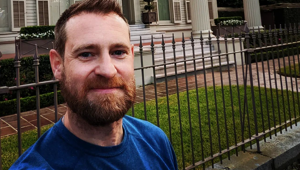

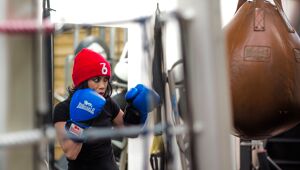


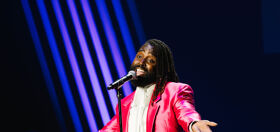
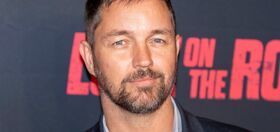
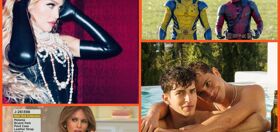
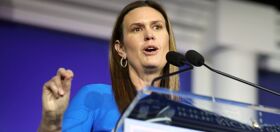

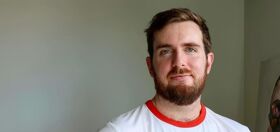
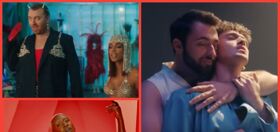
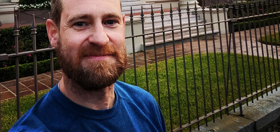


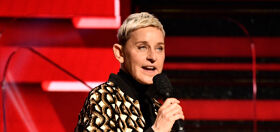

wikidBSTN
I LOVED “Please Like Me”. High hopes then for Thomas’s next show.
Is it too much to hope that Keagan Joyce will make an appearance?? 🙂
Kit McCollum
Slight correction: New episodes air on Freeform every Thursday. The episode isn’t put up on Hulu until the next day.
witchboybrian
On the subject of teenage autistic girls on television, the UK show Hollyoaks has had an autistic teen played by an autistic actress for a couple of years. Just so you know.
This show does sound great, I loved Please Like Me.
Chevelter
I binged watched the first four episodes on the freeform app on my AppleTV. The first episode is 42 minutes, the rest are 20 minutes. The showhas the same strengths (and weaknesses) as Please Like Me. Some parts are brilliant, witty and poignant. Other parts are odd and awkward. It mixes funny and sad the same way Please Like Me did. The music is upbeat and similar to Please Like Me. Gay stuff is front and center. There’s kissing and sex talk, so three cheers for Disney. It’s pleasing enough for me to continue to watch, but it’s no Please Like Me. (I’m speaking of the first 3 seasons of Please Like Me; the fourth season is best forgotten).
Joshooeerr
Interesting that the show as an all-female writing team. It might explain some of the oddness around the gay content, though some of that may also just be a reflection of Josh Thomas’s oddness. At one point the boyfriend actually says, by way of foreplay, “Let’s do anal sex”. Maybe it was supposed to be funny. Or maybe no-one involved has much of an idea of how real people actually talk.
Hillers
Such a charming show. I always find myself wanting more as it comes to a close.